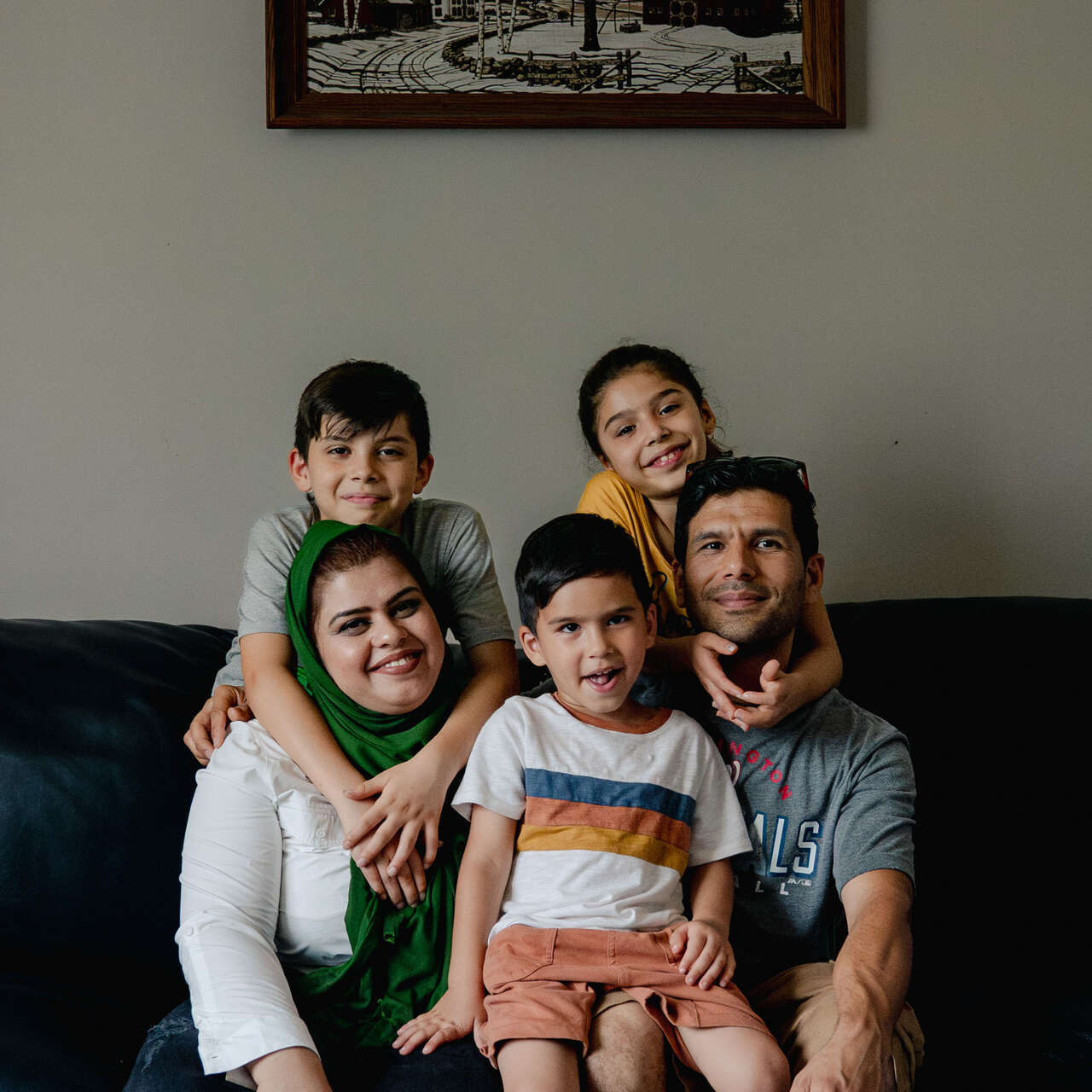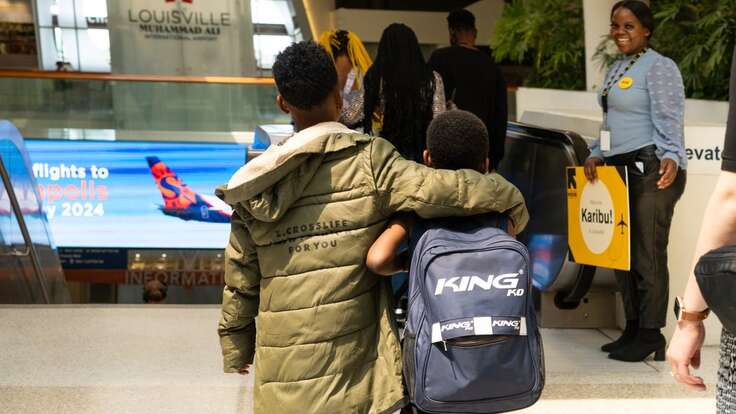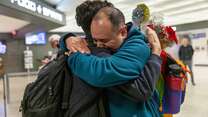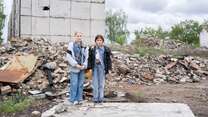U.S. government begins the re-review and potential termination of protections for refugees who do not yet have permanent residence
- Refugees undergo the most rigorous security vetting of any group entering the U.S.
- Refugees, including children, have reportedly been detained and removed from their homes and communities.
- Removing lawfully admitted refugees disregards security checks, erodes trust, and wastes taxpayer money.
- The IRC urges the U.S. government to end these operations and reverse the re-review policy.
Refugees are men, women and children who have fled their home country due to war, persecution, or political upheaval. Some eventually return when it’s safe to do so, others stay in temporary refugee settlements or integrate into nearby countries offering asylum, while a tiny fraction resettle in a third country, such as the United States. 34% of the global refugee population are hosted in just five countries: Islamic Republic of Iran, Türkiye, Colombia, Germany and Uganda.
Learn about the impacts of the suspension of the refugee resettlement program on vulnerable people in crises, how resettlement helps refugees, the work of the IRC, and simple ways you can support refugees.
The U.S. Refugee Admission Program (USRAP) is a safe, orderly and cost-effective pathway for people fleeing conflict and crises, historically supported by both Republicans and Democrats since its creation under the 1980 Refugee Act.
It has offered over 3 million security-vetted refugees a chance to start anew in America. Refugees significantly contribute to their communities, driving economic growth and reinforcing America's global reputation as a leader in humanitarian efforts.
USRAP operates independently from asylum and border systems, with its own funding and management. Despite its global significance and humanitarian focus, refugee resettlement receives only a tiny fraction of overall government resources.
In January 2025, the Trump administration issued an executive order that suspended refugee resettlement, with minimal case-by-case exceptions. Shortly after, it ordered the Departments of State and Homeland Security to prioritize the refugee resettlement of Afrikaners from South Africa believed to have suffered “unjust racial discrimination”. In June 2025, the administration enacted a travel ban, which barred the most at-risk refugees, thereby jeopardizing the main mission of the refugee admissions program.
Suspending the USRAP has harmed those fleeing persecution and blocked families from reunification. Many refugee families are being forced to live apart for years, unable to rebuild their lives together. Family reunification is not just a humanitarian priority—it’s essential for emotional stability, healing, and creating strong, supportive communities. Additionally, it also damages America’s global reputation, strains the refugee protection systems in other parts of the world, and deprives communities of economic and cultural benefits.
The Reception & Placement (R&P) program, which provides essential support during an individual’s first 90 days in the United States, was also abruptly halted by the Trump administration soon after taking office. When the stop-work order was issued, the IRC was assisting nearly 6,000 clients within their first 90 days of arrival. It exacerbated critical issues such as housing insecurity and food shortages, leaving countless families without adequate support.
Despite the stop-work order, IRC programming continued to support thousands of impacted clients in the US, ensuring that people understand their rights and have access to the available support systems to rebuild their lives and regain self-sufficiency. Although R&P was restarted in June 2025 for a handful of refugees due to litigation under the Pacito v. Trump case, thousands remain waiting due to the travel ban, which blocks people from twelve countries from entering the U.S.—many of which are facing urgent humanitarian crises.
Refugee resettlement brings economic benefits to host countries. A 2025 report published by the National Foundation for American Policy revealed that a reduction of lawful pathways, which includes the USRAP, could cost the US economy almost $900 billion between 2025–2028.
Another study by the Department of Health and Human Services found that refugees and asylees generated nearly $124 billion in positive fiscal impact for the US economy between 1990 and 2022.
Learn more about how refugees strengthen the U.S. economy.
The USRAP is managed by the U.S. government, which works with the United Nations High Commissioner for Refugees (UNHCR) and designated humanitarian agencies to identify, screen and vet prioritized populations for resettlement.
Each year, the president, in consultation with Congress, decides the target level of refugee admissions and issues this decision via a Presidential Determination.
On October 30, 2025, the Trump Administration announced a record low refugee cap of just 7,500 for fiscal year 2026. For context, the U.S. averaged a refugee cap of more than 92,000 from 1980 to 2025, and the refugee cap for fiscal year 2025 was set at 125,000.
This decision will leave more families separated and vulnerable individuals stranded as the president has determined that the 7,500 refugee resettlement slots made available will be “primarily” allocated to Afrikaners from South Africa. Meanwhile, thousands of other refugees who were vetted and approved to arrive in the U.S. prior to the USRAP suspension have been left in limbo.
Applicants for refugee admission to the U.S. must satisfy the following criteria:
- Meet the definition of a "refugee" as determined under U.S. law
- Be among those of special humanitarian concern to the US, as designated by the President through the annual refugee admissions ceiling
- Not be firmly resettled in another country
- Pass medical, security vetting, and background checks
- Be otherwise admissible to the US under immigration law
Even if an individual meets all the criteria, the USRAP does not confer any right or entitlement to be admitted to the U.S.
The hardest way to come to the U.S. is as a refugee.
Refugees admitted through the USRAP undergo the most extensive vetting of any group seeking entry to the U.S. Most are first registered and referred by UNHCR, which identifies individuals in need of resettlement. The U.S. government then interviews and selects each refugee individually through a rigorous screening process.
The program does not admit people who have committed violations of humanitarian and human rights law. Security screenings are intensive and led by U.S. government authorities, including the FBI, the Department of Homeland Security, the Department of Defense, and other security agencies. The process can take years and is followed by further security checks after refugees arrive in the U.S.
Resettlement Support Centers (RSC), run by agencies like the IRC through cooperative agreements with the Department of State, have helped refugees and their families prepare their cases for processing and security vetting, including by compiling personal data for interviews with officials from the Department of Homeland Security (DHS).
Once refugees are cleared for resettlement, the U.S. government works with the IRC and other national resettlement agencies to help them restart their lives in America.
Refugees are usually placed in a city where they have relatives or friends, or where there is an established community that shares their language or culture. Other considerations include the cost of living and access to medical services. However, as legal U.S. residents, refugees could ultimately live in any state they chose.
These are some of the steps included in the resettlement process:
Preparation for travel
Before refugees leave the countries where they temporarily reside, they sign promissory notes agreeing to reimburse the U.S. government for travel costs. They also attend a class to learn about what to expect when they arrive in their new country, with briefings on American culture, U.S. laws, healthcare access and other critical information. Officials also conduct a final screening and additional security checks before departure.
Arrival in the U.S.
Refugees are greeted and welcomed at the airport by case workers from resettlement agencies like the IRC to ensure their transition is as comfortable as possible. Agencies are responsible for finding a suitable, affordable home for refugee families, something many of these refugees have gone without for years. Families also receive basic furnishings, food and other immediate assistance for a limited period of time.
In the past under the Biden administration, initiatives like Welcome Corps allowed Americans across the country to offer a lifeline to safety by sponsoring refugees and supporting their resettlement process.
Getting on their feet
For the first 90 days, resettlement agencies work with state and local governments and community organizations to help new arrivals settle into their communities.
- Refugees are encouraged to find work quickly—and most do. Agencies reach out to local employers, some run by former refugees or other immigrants, to find job opportunities for them. Refugees can also receive support in putting together their resume and preparing for job interviews.
- Learning English is an essential step to becoming self-sufficient. Agencies help assist refugees to enroll in English courses at their local offices or help families find classes nearby.
- Parents are informed about schooling options and caseworkers help to enroll children in school. Aid agencies help ensure each child has a backpack, notebooks and other supplies for their first day.
- Refugees are introduced to their local health care system. Although they have had thorough check-ups before entering the U.S., they receive additional examinations by medical professionals in their new communities.
- Newly arrived refugees have endured years of trauma and hardship; that emotional burden does not lift once they’re in the U.S. Agencies, service providers and local communities work together to help survivors of violence and human trafficking receive the support and care they need in order to recover.
Once they acclimate to their new environment, refugees thrive and contribute to their communities, starting careers and creating new businesses.
The IRC resettles refugees through a network of 28 offices across 17 states, a public-private partnership between the US government and non-profit organizations.
We work directly with new arrivals and welcoming communities to implement resettlement and integration services, providing temporary financial assistance, employment services, workforce development, interpretation services, cultural orientation, school registration, and other programs.
Each resettlement office serves as a free, one-stop center for refugees’ needs during their pivotal first months in the U.S. Through a network of staff members and volunteers, the IRC helps refugees learn about life and customs in America, secure jobs, and learn English. We provide most of the basic things they need to restart their lives here and help them overcome cultural barriers so that their adjustment is as easy as possible.
Through community gardening, nutrition education and small-business farming, the IRC's New Roots program also gives hundreds of refugee farmers the tools and training they need to grow healthy and affordable food and become self-sufficient.
The IRC urges the Trump administration to reassess and reconsider the refugee admissions cap and regional allocations for fiscal year 2026. The IRC views this policy decision as a significant setback for America and calls on the Trump administration to also rescind the travel ban, fully reopen the refugee resettlement program, and work with its partners around the world to maintain global resettlement slots by pursuing a thorough, evidence-based evaluation.
At a moment when the international community faces the largest refugee crisis on record, the need for resettlement is great. Continuing to be a land of refuge and a place of freedom for those fleeing tyranny is consistent with core American values. This will ultimately benefit American communities alike and there is no real justification for ending one of the most established, secure, and effective programs that offers a route to safety.
Everyone can help refugees by welcoming them as new and valuable members of American society.
You can help refugees by asking the Trump administration to support refugee resettlement. You can also volunteer at a local resettlement agency; become an English tutor, or a mentor to a family; donate money, furniture and household items; educate other people about refugees; and employ or encourage local businesses to hire refugees.
Ways to help right now:
- Help the IRC support refugee families in crisis with a donation: Donate now
- Look for IRC volunteer opportunities assisting refugees in the U.S.
- Rent to refugees.





